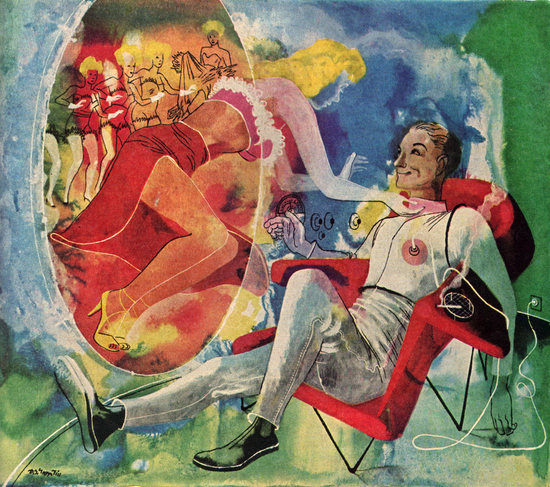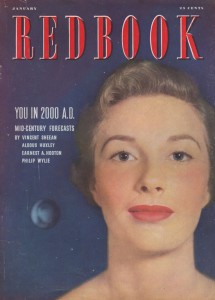Sit Back and Plug In: Entertainment in the Year 2000
Was our future to be delightful or depraved? Sort of depends on your perspective
![]()

Artist David Stone Martin imagines the Telesense entertainment device of the year 2000 (1950)
In the January, 1950, issue of Redbook author Philip Wylie laid out his predictions for the year 2000. Wylie’s predictions focused on the world of leisure and, depending on your point of view, it’s either a delightfully hedonistic vision of utopian living finally realized — or a darkly hedonistic vision of sloth and sin.
This version of the 21st century includes new drugs that will replace the old-fashioned booze and painkillers of mid-century; an interactive television which includes a special suit that allows you to engage all five senses; and vacations to Mars whenever you please.
Reading for pleasure will be rare and spectator sports will be enjoyed, though college football athletes will no longer be required to study anything. Wylie doesn’t say it explicitly, but we can assume that he means college athletes of the year 2000 would be paid — a contentious issue here in the 21st century. Hunting will be a thing of the past, but not because of any moral objections to killing animals: the forests will have simply vanished and wild animals completely exterminated. Even the bathing suit will be a thing of the past, as society becomes more comfortable with nudity and discards puritanical notions of modesty. Again, depending on your personal preferences these are either wonderful advancements in society or depraved practices in a world gone mad.
At the end of Wylie’s article he encourages readers to cut out his article so that their grandchildren might read it and gauge its accuracy. Well, how did he do?
From the January 1950 issue of Redbook:
The principal pastime of our grandchildren will surely be Telesense. With the telephone first, then the cinema, next the radio, and now television, we have shown that we are determined to carry vicarious sensory experience in the home to its utmost lengths. In fifty years, then, the average American will spend some five hours a day in his “Telesense room” or “cabinet.” Here, dressed in a Telesense suit—a layer of flexible metal outside, a layer of ventilated plastic inside, and a fluid between—the citizen of A.D. 2000 will take a position in an elaborate electromagnetic field, before a three-dimensional image-projector of life size. To television’s color, hearing and sight, Telesense will electromagnetically and chemically add touch and smell.
Telesense will provide massage hours—light for relaxation and heavy for reducing. And, of course, the “heavenly hunks of men” and the “delicious blonde eyefuls” of A.D. 2000 will not merely flirt with their vast audiences, croon to them, roll distant eyes, and woo them abstractly, as now. They will be able actually to make their audiences feel them hanging around their necks, or sitting in their laps.
Cover of the January 1950 issue of Redbook magazine
“Spectator sports” will be conducted in plastic-domed stadia. Football and baseball will still be played—though Telesense will keep ninety per cent of the audience at home. College athletes will no longer be required to study anything. The private automobile will have been replaced by the Buzzcopter—a 300- m.p.h., single-control air machine, powered by electronic storage batteries with a 10,000-mile capacity. “Buzzcopter polo” played in fast machines at low altitudes will supply the disaster-hungry audience with an average of two smashups per game. Deaths throughout the U.S.A. in the crashes of private Buzzcopters—incidentally—will average five hundred daily; and injuries, over four million a year. The inability of people to stop the trend of car accidents will gradually, have made Americans decide that the thing to do about the cost of the Machine Age to life and limb is to be sporting about it.
In this whizzing, stimulated, sensory world, a real thrill will be as hard to come by relatively as it is now, compared with Grandpa’s day. Grandpa, as a youth, got a kick out of a husking bee—Grandma out of a quilting bee. We require a jam session, at least. And that trend explains why gambling, in fifty more years, will be everyman’s (and woman’s and child’s) passion. Half the tax revenue will derive from continuous lotteries, in which scores of millions will regularly participate.
Naturally, the citizens of such a society will be too overstimulated to rest in the “old-fashioned” manner of merely lying down, relaxing, and going to sleep. Not only sleep, but also rest, and intoxication, too, will be managed by various pills—far less harmful and far more diverse in their effects than the thousands of tons of alcohol pain-killers and sleeping pills we currently consume every day. The drinking of alcohol will largely have been abandoned (owing to the hangovers it produces) in favor of a hundred different sorts of pills which will make people relax, have pretty dreams, grow talkative, become peacefully quiet, slumber, cat- nap, and so on.
Hunting will be a memory—the forests will have vanished and the remaining game will have been exterminated. Travelers will make the round trip to Mars via space ships, carrying small hydroponic gardens to insure a steady supply of oxygen and to deodorize the air. Several parties of sportsmen-scientists will have been lost on expeditions to Venus.
That old criterion of culture, the bathing suit, for instance, will be worn only for warmth, or to cover scars, or to disguise a bad figure. In fifty more years, nudity will have been reached—and passed! Passed, in favor of such trivial decoration as appeals to the taste and fancy of each individual.
Eating will still be regarded as a pleasure, though the basis of sixty-five per cent of the food consumed will be marine algae, vat-raised yeast protein and starches built up by industrial photosynthesis—all of these flavored with substances derived from the waning petroleum supplies.
Few Americans will have carried the study of reading beyond the length needed for understanding technical instruction. Thus, though music will be abundant and interesting, architecture, painting and sculpture widely admired, and ballet a national fad, reading for pleasure (or to get abstract information) will be exceptional. Cut these articles out, however, (on the chance that your grandchild will still be able to read in A.D. 2000) so he may check their accuracy.
All in all, Wylie’s predictions are perfectly representative of postwar hopes and concerns for the future. Sure, we’ll enjoy our flying cars (or “Buzzcopters”) but at what cost? How many people will be killed and injured as a result of this new technology and will Americans simply accept the human cost as we eventually did with the rise of the automobile? Sure, we’ll have the ability to experience virtual worlds but what kind of side effects will the overstimulation present? Will we even be able to fall asleep at night with such an elevated heart rate?
Last month we looked at Aldous Huxley’s predictions in the same issue of Redbook. Huxley imagined that increased worker productivity would likely mean an increase in wages and more leisure time. Neither of these predictions came true, but one wonders if they had whether any of Wylie’s more radical predictions for the hedonistic society of the future may have come with them.
/https://tf-cmsv2-smithsonianmag-media.s3.amazonaws.com/accounts/headshot/matt-novak-240.jpg)

/https://tf-cmsv2-smithsonianmag-media.s3.amazonaws.com/accounts/headshot/matt-novak-240.jpg)